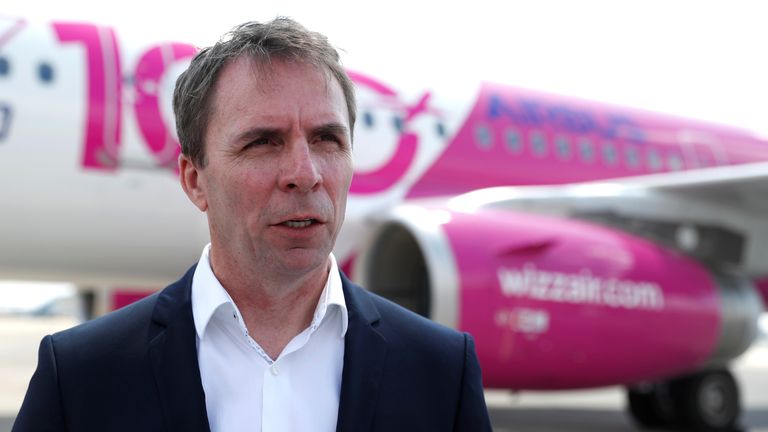Air fares likely to increase significantly by end of summer, Wizz Air boss says
Air fares are likely to increase by “upper single-digits” between July and September, the CEO of Wizz Air has said.
Airlines in the UK and across Europe have been struggling to keep up with demand as travel returns to normal for many holiday destinations for the first time since the beginning of the COVID-19 pandemic and prices have shown “low single-digit” growth in April to May, József Váradi said.
British Airways has been the worst-affected this week but easyJet and Wizz Air have also been among the airlines cancelling flights, affecting thousands of passengers.
Wizz Air posted a reported net loss of €642.5m (£546.5m) for the year but has said it is planning to grow capacity by more than 30% and 40% in the first two quarters of this financial year.
Group chief executive József Váradi said: “The industry is witnessing supply-chain issues across airports, including in our network.
“Shortages of staff in air traffic control, security and other parts of the supply-chain are impacting airlines, our employees and our customers directly.
“We are deploying extra resources to minimise disruptions and urge all other stakeholders to do the same, having customers’ best interests always in mind.”
Wizz Air carried more than 27 million passengers in the year to 31 March – up by 166% on the previous year, which was marred by COVID-related travel restrictions.
Read more:
Passengers in tears as easyJet, British Airways and Wizz Air axe services
Thousands of rail workers to walk out for three days in June in biggest strike since 1989
Mr Váradi said he believes the virus is now endemic.
He also said that the company has “managed” the trading impact from the war in Ukraine, which began when Russia invaded the country in late February.
He said: “The airline industry remains exposed to externalities such as air traffic control disruption and continuing operational issues within the airports sector, adding to a volatile macro environment.
“Rising energy costs and inflation across Europe will continue to favour ultra low-cost carriers as consumers reconsider spending choices.
“We are partially hedged over the summer providing partial protection against fuel price surges and we continue to look at opportunities to extend these insurance coverages for the full fiscal year at the right conditions.”
Shares in Wizz Air were down more than 9% on Wednesday morning.



